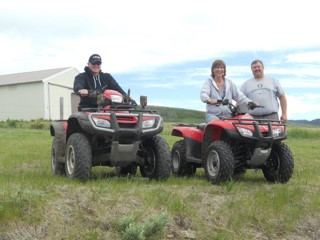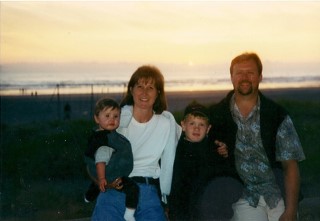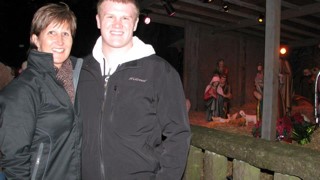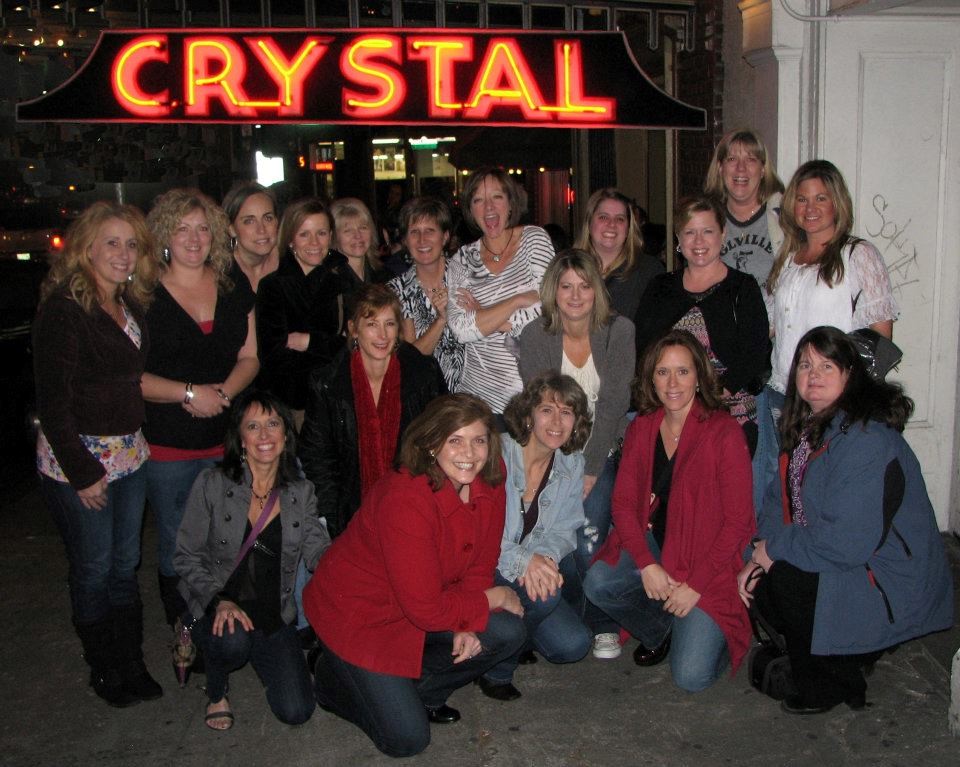"I'm Sorry" - How Losing My Mother Shaped My Approach To Care
“I’m sorry.”
Those are usually the first words spoken in response to me revealing that I lost my mom to cancer as a sophomore in college. When you really consider the words, the response doesn’t make a whole lot of sense.
The person apologizing never manipulated the genes that predisposed my mother to a higher risk of ovarian cancer. They never were the perpetrators of my mother’s relapse as she approached the one-year mark of remission. Nor was it them that caused my mother’s shocking weight loss, countless bowl obstructions from organ failure or rendered her bed ridden, cognitively distant and robbed of the brilliant, wonderful woman she once was.
That was cancer.
People apologize for the terrible pain that this disease caused. I feel it’s only natural to respond with some form of sympathy or empathy when news of a loss becomes the topic of a conversation. We are all, on a fundamental level, connected emotionally. Yet, for me, the grief, pain, and confusion over the loss of my mother was something that I came to terms with a long time ago. And while sharing can sometimes be therapeutic when dealing with the death of a loved one, I find it even more impactful as a form of inspiration. But before I get to that, I want to share a little about the woman whom has always inspired me: Kari Jo Lien-Erdwins.
Now, to understand my mom you’ve got to understand something first -- the five F’s of Kari.
Fire, Flowers, Fun, Family, and Friends.
On warm summer evenings, especially during summer break (she taught high school US history), my mom could always be found outside at one of four fire pits around our house. Yes, you read that right: four fire pits.
She often sat huddled close, wrapped in a flannel jacket, a beer in hand listening to crackles of the fire while she gazed up at the stars. My mother was quite the intellectual wrapped in a country lady. We often stayed up late talking over ethical dilemmas in today’s news, or pouring over major turning points in US economics following the Great Depression. There were even talks of John Steinbeck’s use of personification in the Grapes of Wrath. That’s not to say we wouldn’t stray into our favorite Saturday Night Live sketch (she was particularly fond of “Pat,” the mysterious, androgynous character) or other, less serious topics. These nights will always hold a special place in my heart.
The next “F” is for Flowers, for which my mother had a plethora surrounding our property that she diligently attended to early in the morning and late in the evening. I can still recall sounds of crickets chirping, song birds, and a garden hose showering hanging baskets filled with royal purple, deep red, and bright yellow flowers. Thank goodness I was never allergic to pollen because our house was surely a nightmare for anyone with seasonal allergies.
Now Fun -- the third “F” -- is tricky because, honestly, my mom enjoyed it all. If it was summer, we were on a boat cruising up and down the Columbia River Gorge or packing up for a week-long camping trip in Crane Prairie. My mother was a woman who always dressed well, but when we camped, everything went out the door. She loved long cross-country trips as well. One particularly memorable trip was following half of the Lewis and Clark Trail for the 200th anniversary of their expedition. Every stop was a 3-hour long “ordeal”, full of pictures and her mini lectures to our “patient and enthusiastic family.” The trip also included purchases of more books, material, and videos then any teacher could possibly go through in a school year. That highlights another important passion and concept of fun for my mother: teaching history. And boy, did she ever have a passion for it.
She often would spend hours planning unique activities to engage her students and cultivate cultural learning. One of her favorites was a class potluck, where she asked each student to bring in a family recipe and share about the history behind their dish. The students absolutely loved this, as did some of the other faculty who could be found sneaking in for taste of her student’s leftovers. This is but a taste of her passion for teaching and learning. Better still, her passion was infectious to the point that some of the most troublesome kids entering her class left as some of her best students. That was just who Kari was.
She had a way of seeing the best qualities of someone and then finding a way to draw it out. She cared so deeply for those around her and would do whatever it took to see to it that they found success. In fact, that quality of her is a perfect transition to her fourth “F”: Family.
Family was huge for my mother. From birthdays to Christmas Eve, every gathering was a big event.
And I know what you’re wondering: “Did your mom make you take a bunch of pictures too?”
Yes, she certainly did. Oh god, did we ever take photos.
I think I feel the pain of those unfortunate souls back in the 1800’s sitting for hours to have one of the first ever pictures taken. Only in my case, one picture was never enough as I weathered the storm of flashes and comments of “Ryan, smile normal” or quick retorts to my pleas with “okay, just one more.” I hated it then, but looking back through all the photos now, I’m glad my mom took the time to do it.
Every memory with family was frozen in time and I often find myself reliving Thanksgivings at The Erdwins’ or Christmas Eves at my Grandma’s house. Among the photos are also pictures of countless Friends, the final “F”.
To say my mother was a social butterfly would be an understatement. A great example is in the picture below. That’s her in the middle of a small group of those friends, below the glowing neon “T.”
While she may have had a core group of childhood friends, she accumulated the rest in ways that made “how do you know them?” an unavoidable question. That was my mother. Always looking for a new opportunity to share in the life of someone else.
She did it through adult softball teams, school events, or friends’ functions. When she started chemo, I knew that everyone in her cancer clinic would know who Kari Lien-Erdwins was by the end.
And they did.
Nurses, doctors, fellow patients and more all had kind and positive things to say about my mother. When I visit my mentor, my mom’s former Oncologist, I am reminded of my mother’s lasting impression by a fountain, which we donated to the clinic in her memory. It proudly sits in the patient waiting room, emanating the same soothing presence that my mother exuded.
I’m blessed to be her son.
Losing her initially felt like a part of my world was ripped out.
The comfort of someone’s kind, remorseful words, and the infallible use of “I’m sorry” were most appropriate initially, but as I continued through college, assured that I was clandestine to become a doctor in honor of her, I came to a realization: Why are you sorry for the joys that someone brought into this world? Why are you sorry for their story of resilience in the face of suffering and pain? Why are you sorry for how close it brought family and friends together?
My mother once said something that I will never forget; something that helped replace my grief with purpose. When asked why she was so seemingly calm and accepting of her diagnosis, she responded: “If anyone could get cancer, why not me?” Maybe she some how knew that her eventual death would, in some way, be meaningful; to use it as a story to share with others. Something to relate with and to heal with.
As a future doctor, my experience will undoubtedly enable me to help heal countless numbers of patients because I am able to empathize. Reflecting on and honoring the memory of those we lost is one of the greatest powers we, as future physicians, can use to comfort and treat our patients.
They’ll often come to us scared and vulnerable, afraid that the loss of a loved one or their terminal diagnosis will forever have a hold over them. I believe in addition to addressing their concerns from a medical perspective, it is equally important to enable their ability to enjoy the time they have left with that person or reflect on the best moments they shared with them.
“Reflecting on and honoring the memory of those we lost is one of the greatest powers we, as future physicians, can use to comfort and treat our patients. ”
When my mom became terminal, we packed our bags and took my grandmother’s RV on a road trip to a family reunion in Montana. With help from her physician and Hospice, we were able to make that trip one of our best family outings to date. When faced with similar scenarios as a future physician, I undoubtedly will be a proponent of this for my patients because I know how much it meant to my family.
In the end, the loss of my mother may have been one of the hardest things I’ve endured in life, but I wouldn’t say it’s something I’m entirely sorry for.
Her loss has given me a gift -- an experience -- that I can share with those I will one day treat. From it I have learned one of the biggest lessons of my medical career.
When you get the opportunity to help a patient dealing with grief, it is okay to start with “I’m sorry”, but follow with “tell me their story.” I promise you they have one to share, and through the tears there will be laughter, remembrance, and healing, just as there has been for me.
Ryan Erdwins
Osteopathic Medical Student - 2nd year (OMS II)
Executive President, Student Government Association
Pacific Northwest University of Health Sciences






